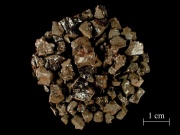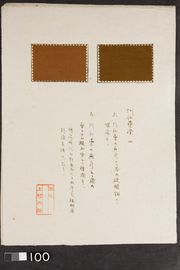Difference between revisions of "Cutch (dye)"
| (3 intermediate revisions by the same user not shown) | |||
| Line 1: | Line 1: | ||
[[File:cutch_pieces_1.jpg|thumb|Pieces of cutch]] | [[File:cutch_pieces_1.jpg|thumb|Pieces of cutch]] | ||
== Description == | == Description == | ||
| − | + | [[File:cutch 3up2.jpg|thumb|Fabric dyed with cutch]] | |
A natural catechu dyestuff and tanning agent obtained from the heartwood, leaves, pods and twigs of several trees, such as ''Acacia catechu'' or ''Uncaria gambier'', that are native to southeast Asia and India. Cutch was used in India since ancient times. It was exported to Japan and China as early as the 1500s but was not used in Europe until the 1800s. The primary colorant in cutch is [[catechin]]. The dark brown to black, water extracted dye is sold as dried chunks or a coarse powder. It colors wool, silk and cotton to a light brown color without a mordant (called khaki) and various shades of dark brown with a mordant. Cutch retains its color well through washings and exposure to light. Cutch may also be used for tanning where it produces a stiff yellow leather. The primary tannins are [[catechutannic acid]] (25-35%) and catechin (2-10%). This dyestuff became obsolete, however, between World War I and World War II. | A natural catechu dyestuff and tanning agent obtained from the heartwood, leaves, pods and twigs of several trees, such as ''Acacia catechu'' or ''Uncaria gambier'', that are native to southeast Asia and India. Cutch was used in India since ancient times. It was exported to Japan and China as early as the 1500s but was not used in Europe until the 1800s. The primary colorant in cutch is [[catechin]]. The dark brown to black, water extracted dye is sold as dried chunks or a coarse powder. It colors wool, silk and cotton to a light brown color without a mordant (called khaki) and various shades of dark brown with a mordant. Cutch retains its color well through washings and exposure to light. Cutch may also be used for tanning where it produces a stiff yellow leather. The primary tannins are [[catechutannic acid]] (25-35%) and catechin (2-10%). This dyestuff became obsolete, however, between World War I and World War II. | ||
| − | + | [[File:15 Catechu_pieces.jpg|thumb|''Katekyu'']] | |
| − | [[File: | + | [[File:Uemura 05-29-2009 100.jpg|thumb|Silk dyed with Katekyu branches and leaves]] |
== Synonyms and Related Terms == | == Synonyms and Related Terms == | ||
| Line 14: | Line 14: | ||
Catechin is soluble in hot water, methanol. | Catechin is soluble in hot water, methanol. | ||
| − | + | CAS# = 8001-76-1 | |
| − | |||
| − | |||
| − | |||
| − | |||
| − | |||
| − | |||
| − | |||
| − | |||
| − | |||
| − | |||
| − | |||
| − | |||
| − | |||
| − | |||
| − | |||
| − | |||
| + | == Resources and Citations == | ||
| − | + | * See also [[https://cameo.mfa.org/wiki/Category:Uemura_dye_archive '''Uemera Dye Archive''' (Asenyaku/Katekyu)]] | |
* Helmut Schweppe, Schweppe color collection index and information book | * Helmut Schweppe, Schweppe color collection index and information book | ||
Latest revision as of 13:16, 22 June 2022
Description
A natural catechu dyestuff and tanning agent obtained from the heartwood, leaves, pods and twigs of several trees, such as Acacia catechu or Uncaria gambier, that are native to southeast Asia and India. Cutch was used in India since ancient times. It was exported to Japan and China as early as the 1500s but was not used in Europe until the 1800s. The primary colorant in cutch is Catechin. The dark brown to black, water extracted dye is sold as dried chunks or a coarse powder. It colors wool, silk and cotton to a light brown color without a mordant (called khaki) and various shades of dark brown with a mordant. Cutch retains its color well through washings and exposure to light. Cutch may also be used for tanning where it produces a stiff yellow leather. The primary tannins are Catechutannic acid (25-35%) and catechin (2-10%). This dyestuff became obsolete, however, between World War I and World War II.
Synonyms and Related Terms
Natural Brown 3; CI 75250; catechu (Ned.); katechu (Deut.); cachou (Fr.); cato (Esp.); acacia catechu (It.); suc de japon; cashoo; terra japonica; khair; catechin; Japan earth; Bengal cutch; Bombay catechu; gambier; gambir;
Physical and Chemical Properties
Catechin is soluble in hot water, methanol.
CAS# = 8001-76-1
Resources and Citations
- See also [Uemera Dye Archive (Asenyaku/Katekyu)]
- Helmut Schweppe, Schweppe color collection index and information book
- Ralph Mayer, A Dictionary of Art Terms and Techniques, Harper and Row Publishers, New York, 1969 (also 1945 printing)
- Palmy Weigle, Ancient Dyes for Modern Weavers, Watson-Guptill Publications, New York, 1974
- John and Margaret Cannon, Dye Plants and Dyeing, Herbert Press, London, 1994
- F. Crace-Calvert, Dyeing and Calico Printing, Palmer & Howe, London, 1876
- Colour Index International online at www.colour-index.org
- Judith Hofenk-de Graaff, Natural Dyestuffs: Origin, Chemical Constitution, Identification, Central Research Laboratory for Objects of Art and Science, Amsterdam, 1969
- G.S.Brady, Materials Handbook, McGraw-Hill Book Co., New York, 1971 Comment: p. 165
- Matt Roberts, Don Etherington, Bookbinding and the Conservation of Books: a Dictionary of Descriptive Terminology, U.S. Government Printing Office, Washington DC, 1982
- Random House, Webster's Encyclopedic Unabridged Dictionary of the English Language, Grammercy Book, New York, 1997
- The American Heritage Dictionary or Encarta, via Microsoft Bookshelf 98, Microsoft Corp., 1998
- Art and Architecture Thesaurus Online, http://www.getty.edu/research/tools/vocabulary/aat/, J. Paul Getty Trust, Los Angeles, 2000



